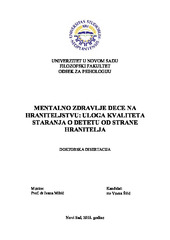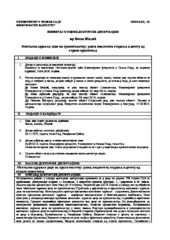Mentalno zdravlje dece na hraniteljstvu: uloga kvaliteta staranja o detetu od strane hranitelja
Mental health of children in foster care: therole of quality of care provided to children byfoster carers
| dc.contributor.advisor | Mihić, Ivana | |
| dc.contributor.other | Jerković, Ivan | |
| dc.contributor.other | Žegarac, Nevenka | |
| dc.contributor.other | Mihić, Ivana | |
| dc.creator | Шилић, Весна | |
| dc.date.accessioned | 2019-03-25T12:17:13Z | |
| dc.date.available | 2019-03-25T12:17:13Z | |
| dc.date.available | 2020-07-03T14:19:14Z | |
| dc.date.issued | 2018-06-22 | |
| dc.identifier.uri | https://nardus.mpn.gov.rs/handle/123456789/10921 | |
| dc.identifier.uri | https://www.cris.uns.ac.rs/DownloadFileServlet/Disertacija152810996673213.pdf?controlNumber=(BISIS)107461&fileName=152810996673213.pdf&id=11488&source=NaRDuS&language=sr | sr |
| dc.identifier.uri | https://www.cris.uns.ac.rs/record.jsf?recordId=107461&source=NaRDuS&language=sr | sr |
| dc.identifier.uri | https://www.cris.uns.ac.rs/DownloadFileServlet/IzvestajKomisije152811030192578.pdf?controlNumber=(BISIS)107461&fileName=152811030192578.pdf&id=11489&source=NaRDuS&language=sr | sr |
| dc.description.abstract | Istraživanje prikazano ovim radom imalo je za cilj da opiše mentalno zdravlje dece na hraniteljstvu ranog školskog uzrasta i da sagleda kakvu ulogu u aktuelnom stepenu njihovog psihosocijalnog funkcionisanja ima kvalitet brige koji im je pružen u hraniteljskoj porodici. Kvaliteta staranja o detetu je konceptualizovan iz okvira teorije afektivne vezanosti kao posvećenost hranitelja detetu na smeštaju i podrazumeva nivo emocionalne investiranosti i motivisanosti hranitelja da sa detetom uspostavi emotivno blizak, stabilan i trajan odnos. U uzorak istraživanja je uključeno 82 dece na smeštaju u hraniteljskim porodicama, uzrasta od 5 do 11 godina, koji su štićenici Centra za socijalni rad Grada Novog Sada i više opštinskih centara na teritoriji Vojvodine (Novi Bečej, Bačka Topola, Mali Iđoš i Vrbas), bez ozbiljnijih smetnji u psihomotornom razvoju i koja u aktuelnoj hraniteljskoj porodici borave najmanje dva meseca. U uzorku je podjednak broj dečaka i devojčica, pri čemu dominiraju deca koja su na smeštaju u standardnim (nesrodničkim) hraniteljskim porodicama (90.2 %), u odnosu na srodničke. Podaci o mentalnom zdravlju dece su prikupljani uz pomoć dve skale za procenu dečije psihopatologije koje su popunjavale hraniteljice: Liste provere dečijeg ponašanja za decu od 6-18 godina (Child Behavior Checklist for ages 6-18, CBCL/6-18, Achenbah & Reskorla, 2001) i Liste za procenu dece u socijalnoj zaštiti uzrasta od 4-11 godina (Assessment Checklist for Children for ages 4-11, ACC, Tarren-Sweeney, 2007). Podaci o mentalnom zdravlju su prikupljani i za kontrolni uzorak dece koja odrastaju u biološkim porodicama, ujednačenom po broju, polnoj i uzrasnoj strukturi sa uzorkom dece na hraniteljstvu, kao i u odnosu na pol roditelja koji pruža podatke (majke). Za operacionalizovanje i procenjivanje kvaliteta staranja o detetu od strane hranitelja je korišćen polustrukturirani intervju “To je moje čedo” (“This Is My Baby” interview”, TIMB, Bates & Dozier, 1998) koji se sastoji od standardizovanih pitanja u vezi hraniteljicinih osećanja prema detetu i njihovog međusobnog odnosa i daje uvid u tri dimenzije: prihvatanja deteta na smeštaju kao svog (eng. acceptance), posvećenosti u podsticanju njegovog rasta i razvoja bez emotivne “zadrške” (eng. commitment) i svesnosti o uticaju uspostavljenog odnosa sa detetom na detetov emocionalni i socijalni razvoj, aktuelno i u budućnosti (eng. awareness of influence). Rezultati istraživanja ukazuju da deca na hraniteljstvu u poređenju sa svojim vršnjacima koji odrastaju u biološkim porodicama, ispoljavaju značajno više problema mentalnog zdravlja, pri čemu prednjače problemi sa pažnjom, smetnje afektivne vezanosti u vidu nediskriminativnog, pseudozrelog i nesigurnog ponašanja u 5 interpersonalnim relacijama, eksternalizujući problemi (agresivno ponašanje, kršenje pravila), abnormalni obrasci ishrane (čuvanje, skladištenje i krađa hrane) i samopovređivanje. Mentalno zdravlje dece je determinisano nepovoljnim razvojnim okolnostima koje prethode smeštaju ali i kvalitetom brige koja im je pružena u hraniteljskoj porodici, pa se kod dece o kojima brinu hraniteljice visokog nivoa prihvatanja i posvećenosti beleži manje emocionalnih problema, problema u ponašanju i odnosu sa drugima. Rezultati ukazuju i na moderirajuće efekte kvaliteta staranja, u smislu da je stepen prihvatanja i posvećenosti od strane hraniteljica posebno značajan za decu koja su pre smeštaja u hraniteljsku porodicu imala visoko rizično iskustvo, čineći ih znatno vulnerabilnijim u okolnostima niskog kvaliteta brige, kao što i okolnosti visokog kvaliteta staranja u ovoj grupi dece ostvaruju najintenzivniji protektivni i kompenzatorni efekat. Rezultati su diskutovani u svetlu teorije afektivne vezanosti, u smislu potvrde kvaliteta staranja kao protektivnog činioca koji podstiče rezilijentnost dece i implikacija relevantnih za praksu socijalnog rada u oblasti hraniteljstva. | sr |
| dc.description.abstract | The purpose of the research presented in this paper is to describe the mental health of children in foster care at early school-age and to analyse the role that the quality of care they receive in foster family plays in the current level of their psychosocial functioning. The quality of child care has been conceptualized from the framework of the attachment theory as the commitment of foster carers to the foster children and it implies a level of emotional investment and motivation of the foster carers to establish an emotionally close, stable and permanent relationship with the child. The research sample involved 82 foster children, aged 5 to 11, who are in the care of the Centre for Social Work of the City of Novi Sad and several municipal centres in the territory of Vojvodina (Novi Bečej, Bačka Topola, Mali Iđoš and Vrbas), who are without serious difficulties in psychomotor development and who have been with the current foster family for at least two months. The sample included the same number of boys and girls, and the majority were children in standard (non-kinship) foster families (90.2 %), as opposed to kinship foster families. Information about the mental health of the children was collected using two scales for the assessment of psychopathology in children, which were filled out by foster mothers: Child Behaviour Checklist for ages 6-18 (CBCL/6-18, Achenbah & Reskorla, 2001) and Assessment Checklist for Children for ages 4-11 (ACC, Tarren- Sweeney, 2007). Information about the mental health was also collected for the control sample of children who live with biological families, identical in number, gender and age structure with the sample of children in foster care, as well as in relation to the gender of the parent providing the information (mother). In order to operationalize and assess the quality of child care, the research used the semi structured interview “This Is My Baby” (TIMB, Bates & Dozier, 1998) which contains standardized questions in relation to the foster mother’s feelings towards the child and their mutual relationship and it also provides insight into three dimensions: acceptance of foster child as her own, commitment in encouraging their growth and development without emotional “reservations” and the awareness of influence of the established relationship with the child on the child's emotional and social development, now and in the future. The results of the research indicate that the children in foster care, as compared to their peers growing up with biological families, display significantly more mental health problems, and the most frequent ones are attention problems, attachment related difficulties in the form of indiscriminate, pseudo mature and insecure interpersonal 8 behaviours, externalising problems, aggressive and rule-breaking behaviour, eating problems, food maintenance behaviour and self-injury. The mental health of the children is determined by the unfavourable development circumstances prior to placement in foster care, but also by the quality of care that they receive in foster family, and so the children in the care of foster mothers with a high level of acceptance and commitment display fewer emotional, behavioural and interpersonal problems. The results also indicate the moderation effects of the quality of care, in the sense that the level of acceptance and commitment by the foster mothers is of particular significance for the children who had high-risk experience before they were placed in foster family, which made them significantly more vulnerable in the circumstances of low-quality care, just like the circumstances of high-quality care with this group of children produced a more intensive protective and compensatory effect. Results are discussed in the light of the attachment theory, in terms of confirmation of the quality of care as a protective factor which encourages the resilience of children, as well as the implications relevant to the social work practice in the field of foster care. | en |
| dc.language | sr (latin script) | |
| dc.publisher | Универзитет у Новом Саду, Филозофски факултет | sr |
| dc.rights | openAccess | en |
| dc.rights.uri | https://creativecommons.org/licenses/by-nc-nd/4.0/ | |
| dc.source | Универзитет у Новом Саду | sr |
| dc.subject | deca na hraniteljstvu | sr |
| dc.subject | children in foster care | en |
| dc.subject | mentalno zdravlje | sr |
| dc.subject | kvalitet staranja | sr |
| dc.subject | posvećenosthraniteljica. | sr |
| dc.subject | mental health | en |
| dc.subject | quality of care | en |
| dc.subject | foster mother’scommitment | en |
| dc.title | Mentalno zdravlje dece na hraniteljstvu: uloga kvaliteta staranja o detetu od strane hranitelja | sr |
| dc.title.alternative | Mental health of children in foster care: therole of quality of care provided to children byfoster carers | en |
| dc.type | doctoralThesis | en |
| dc.rights.license | BY-NC-ND | |
| dc.identifier.fulltext | https://nardus.mpn.gov.rs/bitstream/id/44834/Disertacija.pdf | |
| dc.identifier.fulltext | http://nardus.mpn.gov.rs/bitstream/id/44834/Disertacija.pdf | |
| dc.identifier.fulltext | http://nardus.mpn.gov.rs/bitstream/id/44835/IzvestajKomisije.pdf | |
| dc.identifier.fulltext | https://nardus.mpn.gov.rs/bitstream/id/44835/IzvestajKomisije.pdf | |
| dc.identifier.rcub | https://hdl.handle.net/21.15107/rcub_nardus_10921 |



